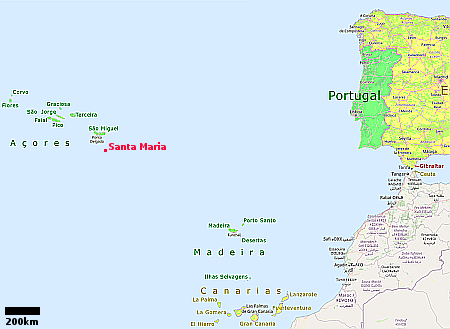Polish rocket startup signs second spaceport deal this week

The Polish rocket startup SpaceForest today announced that it has signed a deal to launch its Perun suborbital rocket with the Atlantic Spaceport Consortium that is developing a spaceport on the island of Santa Maria in the Atlantic.
The launch planned for early 2026 will allow for comprehensive testing of launch procedures and confirmation of the capabilities and compliance of the Polish platform for conducting space experiments and research outside Poland, fully aligned with international standards. The mission will also serve as an opportunity to verify the operation of the PERUN suborbital flight system under nominal mission parameters.
This is the second spaceport launch contract SpaceForest has signed this week, the first being with the Eurospaceport launch platform to be located in the North Sea. According to the press releases, the Santa Maria launch will likely occur first. SpaceForest has also signed an agreement to launch its rocket from Norway’s Andoya spaceport. All three contracts suggest the company is marketing its suborbital rocket to new proposed European spaceports as a way to demonstrate the spaceport’s viability as a launch location.
The Santa Maria spaceport was first proposed by the Atlantic Spaceport Consortium in August 2024, and has already done two suborbital test launches, both using what appeared to be large model rockets. This contract gives it is first customer.

The Polish rocket startup SpaceForest today announced that it has signed a deal to launch its Perun suborbital rocket with the Atlantic Spaceport Consortium that is developing a spaceport on the island of Santa Maria in the Atlantic.
The launch planned for early 2026 will allow for comprehensive testing of launch procedures and confirmation of the capabilities and compliance of the Polish platform for conducting space experiments and research outside Poland, fully aligned with international standards. The mission will also serve as an opportunity to verify the operation of the PERUN suborbital flight system under nominal mission parameters.
This is the second spaceport launch contract SpaceForest has signed this week, the first being with the Eurospaceport launch platform to be located in the North Sea. According to the press releases, the Santa Maria launch will likely occur first. SpaceForest has also signed an agreement to launch its rocket from Norway’s Andoya spaceport. All three contracts suggest the company is marketing its suborbital rocket to new proposed European spaceports as a way to demonstrate the spaceport’s viability as a launch location.
The Santa Maria spaceport was first proposed by the Atlantic Spaceport Consortium in August 2024, and has already done two suborbital test launches, both using what appeared to be large model rockets. This contract gives it is first customer.

